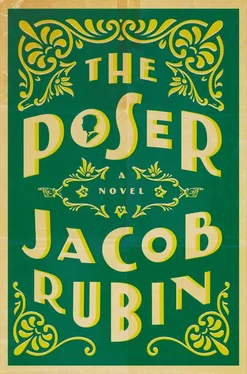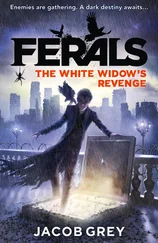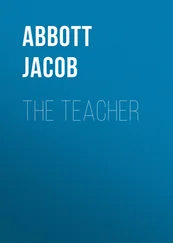This logic, however, could be easily derailed. Late at night, in the blue-black of four a.m., with Julie Dark fast asleep in bed (one of the worst parts of any evening in her company, for each woman slept differently, some on their back, mouth gapingly open, others on their stomach, creaking like an unclosed door in light wind), I would begin to see Mama anew, as a framed savior. Perhaps she was right, I would think, starting to pace. Perhaps this whole Harry Knott stunt represented a crime against my instincts. Hadn’t Bernard betrayed me with Lucy? Why should I trust him? Perhaps he, from the beginning, had so relentlessly campaigned against Mama because he knew she represented the sole threat to his authority. And so I would go back and forth, these doubts spiraling into my chest, where my heart beat more quickly, my legs, too, speeding up until in my quickened motions the mirror reflected an alien silhouette, a man to my terror, that looked not at all like Harry Knott. The need to call Mama would bolt through me, but then, always, the man in the wedding dress would come to my ear saying, “Quite something, really,” and I would need to swallow two green pills to steady myself again.
An hour later, I would lie in bed. Julie would stir or lightly moan, and the bursting moment, now past, would seem the best proof of Bernard’s case. After all, if thinking about Mama caused such tumult, imagine what writing her would do?
And in those moments when I ached to call or write her (moments that grew both less frequent and more extreme), I consulted the scrapbook, which, I knew even then, existed only for her. Each curly-eared article, each tape-mummified photograph awaited her fingers. And one day, we would collect in the Sea View living room, where she would dim the lights, and I would present the completed book, and with each page she would giggle and shake her head, relishing this immaculate trick I had pulled on the world.
And what an addition this political speech would make! That day at the fairgrounds, I read each sentence. When I reached the period, the audience applauded. “The Communist threat is still present and will remain present without the vigilance some deem excessive.” Applause. “It takes a spy to know one.” Applause. Now and then I would look up from the paper to see the concerned, pink-faced men in straw hats holding papers rolled into batons. The women fanned themselves with the same papers, shaking their heads at an indignity I had named. I kept waiting for someone to yell, “Cut!”
As these appearances galloped along, the newspapers, to my shock, reported them as fact. I didn’t know which I preferred more: giving the speeches or reading about them a day later in my bungalow at the Chateau Ravine. In truth, it was hard to divide the two, for the event seemed to happen only when it had been written about, or rather, it was only then that it was confirmed to have happened — its having happened , its being preserved in the gel of that tense, made it delectable, like hearing of a stranger you happened to be.
On those mornings when I expected a newspaper article, I’d open the door to find the West News rolled on the black doormat. Feigning a light curiosity, I’d page through before turning to the Politics section. There I would happen upon the headline, reading the article in a gulp before cutting it out and adding it to the scrapbook.
ACTOR BERNINI ENDORSES SENATOR STENGEL
Former senator Rory Stengel addressed a mixed and boisterous crowd of seven hundred supporters today on the steps of the Old Municipal Tower, marking his third such appearance in Fantasma Falls this month as he, along with his opponents, make their final preparations for the statewide presidential primary on the 21st. While Mr. Stengel has failed to gain a foothold in Fantasma Falls, let alone nationally, his candidacy was bolstered today by the appearance and public support of actor Giovanni Bernini, famous for his role as spy Harry Knott in the films Everyman and No Man’s Land .
Political endorsements from entertainers are nothing new, of course, in this heated primary season. What distinguished this appearance from others was Mr. Bernini’s decision to appear as the character Harry Knott, the fictitious spy the actor plays onscreen. Mr. Bernini took to the podium this afternoon in a suit identical to the one worn by Harry Knott, delivering a twenty-minute address praising Mr. Stengel’s right-wing positions in a manner indistinguishable from that of the character.
These eccentricities did not appear to faze the energized crowd, however. When this reporter canvassed them after the addresses, many confirmed they had attended solely to see the movie actor. “I’d vote for him if I could,” said Carl DeWee, a high school senior. “Have you seen his movies? Now he’s taking it into real life.” Said Timothy Michaels, a retired engineer, “He hunts pinkos in the pictures, and he’ll do it right here, too.”
Opponents may well seize upon this appearance as evidence of the former senator’s reactionary positions. Given the robust turnout at today’s rally, however, it seems a trade the candidate is willing to make. “Mr. Bernini is going to continue to stump with us,” a spokesman from the campaign confirmed. “We’re delighted to have him.”
I campaigned with Rory Stengel for six months, rarely interacting with him backstage and then hugging him or gripping his hand and hoisting it with mine once on it. In this proximity, I learned the strategies. The sanctity of eye contact, for instance. How eruptive a grin can be. Above all, the key was to have said things so many times that when you were delivering the line, whether solemnly or casually, whether to a cigar-chewing reporter or tongue-tied voter, you weren’t ever thinking about the words, but about some essential, misdirected thing — the way you touched a man’s shoulder, for instance, or seemed to smile unthinkingly to yourself — in the way a magician talks always but never about the palmed ace or hidden thrumming dove.
By the time Stengel was defeated in the election, I had stolen what I could from him. Little time passed, perhaps a month, before my appearances recommenced at political rallies and in convention halls up and down the state, at which events I delivered speeches deviating little from the message I preached with Stengel, the primacy of patriotism, mainly, and the specter of communism. “I am a patriot in the stories I tell and in the life I live,” I must have said a thousand times, becoming the master of certain phrases and mottoes, whose syllables I’d run up and down, like melodies. We traveled in a motorcade from event to event, winding our way as far north as Red Rock Shoals.
By that time there had developed a cult of admirers, zealots who attended rallies in my suit and bolo tie and cowboy boots, waving placards and vicious signs. These men seemed to grow in number with each new appearance, and security men often mistook Bernard for one of their lot, checking his passage or giving him a skeptical once-over. “Committed, huh?” a burly organizer once asked him. Bernard answered, “Why, sir, I’m committed to any cause that will awaken this country to the real.” After making it past this guard, I expected Bernard to wink, but he looked solemn, if anything, strutting ahead with the bellicose energy of a football player taking the field. During the rallies, I would sometimes spot him in the crowd itself, waving a sign or joining a chant as if electrified, genuinely, by the policies I described. “Meet the most natural politician this country’s ever produced,” he said when showing me off.
In truth, the content of my speeches mattered little to me. No, what mattered was the performance , of which these addresses were but a small part (and the meaning of them hardly relevant at all). How I walked onstage, waving to the peopled bleachers, the style in which I descended stairs — these mattered as much as my rhetoric or tone of voice, and to test these gestures I began to use the mirror every morning.
Читать дальше












